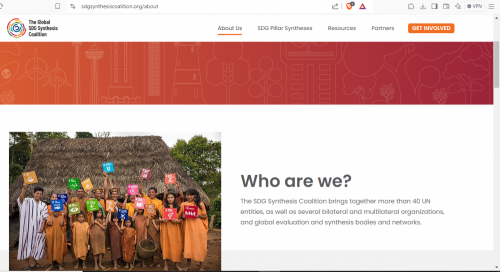
https://www.sdgsynthesiscoalition.org/about
https://www.sdgsynthesiscoalition.org/events/towards-2030-and-beyond-acc...
The SDG Synthesis Coalition brings together more than 40 UN entities, as well as several bilateral and multilateral organizations, and global evaluation and synthesis bodies and networks.
This event will be led by the UN SDG System Wide Evaluation Office (SWEO), recently established by the United Nations Secretary-General to incentivize collective learning across the UN development system. It will be co-sponsored by two UN Member States (Malawi and the United Kingdom) with support from the International Network for Government Science Advice (INGSA), UK Research and Innovation (UKRI), and the Global SDG Synthesis Coalition (UNDP and UNICEF).
The event looks at the role of role of science, digital technologies, AI, and international collaboration in helping decision-makers accelerate progress towards the SDGs. It aligns strongly with the Pact for the Future — being signed by world leaders at the Summit of the Future — in emphasizing the importance of the science-policy interface and use of science in solving complex global challenges. The event will include the announcement of a major new initiative in AI-driven evidence synthesis, which aims to deliver a step change in how evidence is produced and used in tackling economic and societal challenges. It will also highlight the collaborative efforts of the Global SDG Synthesis Coalition, a pivotal initiative bringing together 45 UN entities, over 60 UN Member States, and a growing number of Multilateral Development Banks and other partners, including civil society organizations and the private sector. See agenda attached.
The event is intended to achieve the following outcomes:
- Recognition of the imperative to improve decision makers’ access to evidence on what works to accelerate progress towards the SDGs
- Appreciation of existing efforts to drive improvements in the use of research evidence via the Global SDG Synthesis Coalition and Global Commission on Evidence to Address Societal Challenges
- Identification of new opportunities to harness advances in digital technologies and AI to improve the production and use of evidence synthesis
- Sharing the latest information on new initiatives designed to make it easier for decision makers to access the best available evidence when tackling key challenges
- Strengthening of science policy networks by bringing together UN member states, funding organizations, NGOs and researchers.
The event will involve a panel-led discussion, with Ministerial-level involvement from Malawi and the United Kingdom, as well as representation from the High-Level Steering Committee of the Coalition, which includes Spain, Lithuania, the Philippines, Denmark, Panama, Norway and the two co-sponsoring countries. International and stakeholder perspectives on bridging the science-policy interface will be represented by the International Network for Government Science Advice (INGSA) and other Coalition partners, such as the Wellcome Trust, a key scientific funding and advocacy foundation. An inter-generational approach will be incorporated with young science and evidence advocates.
We are honored to have the following distinguished participants (see biographies attached in alphabetical order by last name):
Opening remarks
- Bob Rae, President of the UN Economic and Social Council and Permanent Representative of Canada to the United Nations
Keynote speakers
- Emran Mian, Director General, Digital Technologies and Telecoms, Department for Science, Innovation and Technology, UK Government
- Hon. Simplex Chithyola Banda, Minister of Finance and Economic Affairs, Malawi Government
- Lord Patrick Vallance, Minister of State for Science, Research, and Innovation, UK Government
Presenters
- Isabelle Mercier, Director, Independent Evaluation Office, United Nations Development Programme and Chair, United Nations Evaluation Group
- John Lavis, Co-lead, Global Commission on Evidence to Address Societal Challenges
Panelists
- Ana Jiménez de la Hoz, Deputy Permanent Representative of Spain to the United Nations
- John-Arne Røttingen, Chief Executive Officer, Wellcome Trust
- Justine Germo Nzweundji, Africa Chapter of the International Network for Government Science Advice
- Karla Soares-Weiser, Editor-in-Chief, Cochrane Library
- Martin Kimani, Executive Director, Center on International Cooperation, New York University
- Will Moy, Chief Executive Officer, The Campbell Collaboration
Co-hosts
- Andrea Cook, Executive Director, UN SDG System Wide Evaluation Office
- Isabelle Mercier, Director, Independent Evaluation Office, United Nations Development Programme and Chair, United Nations Evaluation Group
- Kerry Albright, Deputy Director, UNICEF Evaluation Office
Youth rapporteurs
- Krishna Kishore Pandalaneni, Public Administration student, Columbia University
- Ruben Pohle, Masters student, Yale University









